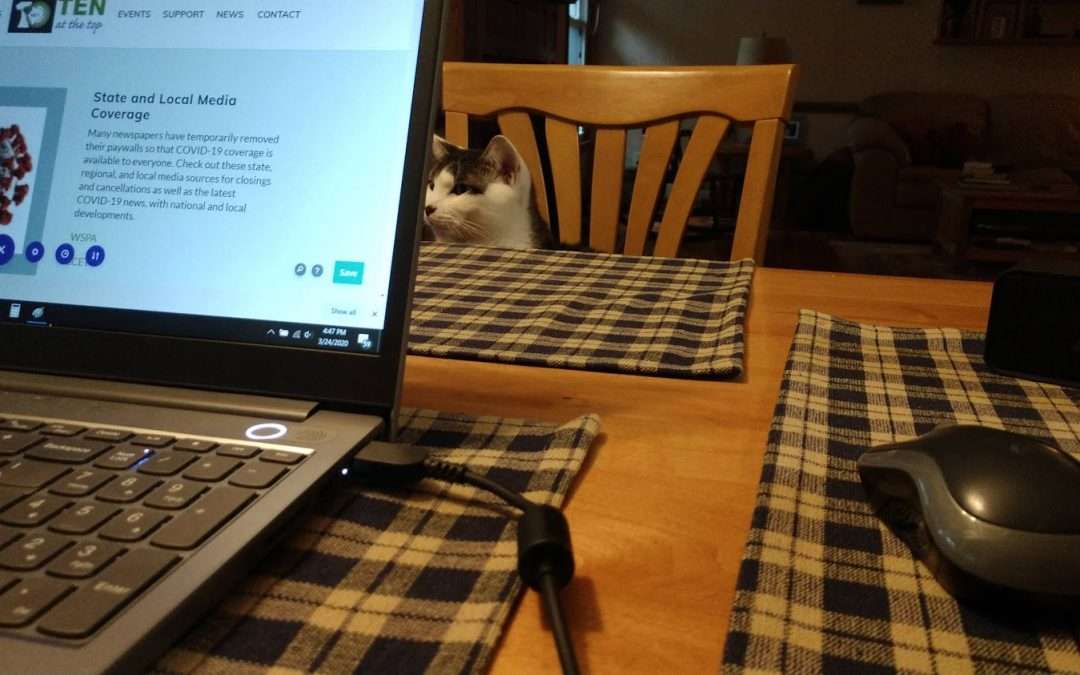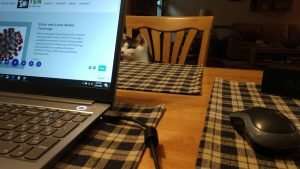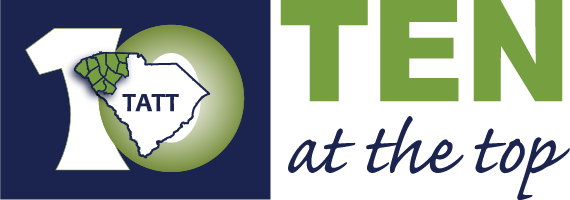
Apr 15, 2020 | Uncategorized
with Sharon Purvis

Rebekah Cribb, Marketing and Event Coordinator at Cribbs Catering in Spartanburg
Rebekah Cribb is the Marketing and Event Coordinator for Cribbs Catering, which she owns with her husband William Cribb—who is connected to several establishments that make up a significant part of the restaurant scene in Spartanburg. He is the chef/owner of Cribbs Kitchen on Main and part of Hub City Hospitality, which includes the very popular Willy Taco, the new hot chicken restaurant Flock Shop (with two locations in Greenville and Spartanburg), and the Fr8yard. The couple are also part owners of The Kennedy. With her connection to that group, Rebekah was a good person to talk to about the impact of COVID-19 on the restaurant industry.
••••••••••••••••••••••••••••••
Q: Restaurants have been hit particularly hard by this pandemic, although the service you provide is essential and you’re able to remain open in a limited fashion. I know this is hard to narrow down, but what has been the biggest challenge? Has there been a challenge that you didn’t anticipate and people may not think about?
It’s really all been very shocking. This happened very fast for our industry. The beginning of the year was so strong, sales up everywhere then—bam, nothing. We had to react and pivot while still in major shock, and it’s been scary! The biggest challenge, in my opinion, has been trying to stay focused on growth and being ready for the bounce back after this while feeling completely defeated in the present. We have to do what we have to do to ride this out while still keeping long-term goals and projects moving.
 Q: With several restaurants and a catering business, you employ a lot of people during ordinary times. To give people a sense of how much of a hit restaurant workers have taken, can you tell us how many your normally have, and how many you have still working?
Q: With several restaurants and a catering business, you employ a lot of people during ordinary times. To give people a sense of how much of a hit restaurant workers have taken, can you tell us how many your normally have, and how many you have still working?
Between all concepts we employee around 300 people; currently we are operating with around 70—mostly salaried and key positions. It’s been heartbreaking to not be able to support the entire team who supports us during this time.
Q: Are all of your restaurants still open currently, or did you make a decision, as some have done, to only keep some of them open?
All of our establishments are still operating at this time.
Q: Your newest restaurant, Flock Shop, had not been open very long before the pandemic hit. Does that make it more of a challenge to keep it afloat than the others that are well established?
Surprisingly no. The “counter service” model that we use at Flock Shop is more easily transitioned to take-out service than our full-service restaurants. Also, being still in the opening stages, the Flock Shop is naturally still adapting to business ebbs and flows. The most crucial piece needed to keep restaurants going right now is customer support, and luckily the newness of this concept has really helped keep the public engaged.
Q: Have you been able to keep Cribbs Catering open at all, with no catered events happening? Or have you been able to adapt to offering prepared meals or something like that to keep that business going?
We have been able to keep Cribbs Catering operational on a very limited scale, but finding a niche and getting momentum is a challenge across the board. We are able to offer individually boxed lunches for corporate clients who are still able to bring catered lunches in. We also are offering great Take and Bake/Grill and Chill meal kits for families to pick up from our downtown kitchen and cook at their homes. That push was inspired by the initial lack of options in the grocery stores. We are also venturing way outside of our typical area of services and partnering with the Spartanburg Regional Foundation to provide pre-cooked freezer meals to be delivered to senior citizens around the county.
Q: What should people know about how you’ve adapted kitchen operations to keep your workers and customers safe?
I like to think that we always take food safety and workplace safety very seriously. We have a responsibility to provide delicious and safe food to our guests, and that takes training and dedication. Currently we have increased sanitation efforts and are following CDC recommendations for social distancing for our employees while at work as best as possible.

Cribbs Kitchen on Main in Spartanburg
Q: How challenging is it to continue to offer your full menu when you can’t really project what’s going to be ordered? Have patterns emerged over the past few weeks to make that easier?
It’s a huge challenge, and therefore we have transitioned to limited menus in some locations. Jamie Cribb at the Kennedy, for example, is putting together some great daily specials and family meals in lieu of offering a full menu. It’s a huge balance between keeping guests happy with new service styles and menu options while keeping costs and waste as low as possible to sustain this lull for an unknown amount of time.
Q: Are you in contact with others in the food service industry in Spartanburg? How has this changed/enhanced/impacted your relationship with other restaurant owners?
Spartanburg has a strong restaurant community, we all have each other’s backs and are sharing this stress right now. We have been able to support some of our staff by networking throughout the food service community. We have also needed each other’s guidance and knowledge to navigate the various support systems and packages set up for small businesses at this time.
Q: Is there some other thing that you would like people to know about your business or the industry in general right now?
I’d say thank you to Spartanburg for the continued support. The community has been generous in pushing for gift card sales, tipping our hard-working staff, and being very intentional in choosing to patronize local eateries throughout all of this! We can’t wait to get back to hosting guests in OUR dining rooms—I believe we will all have a better appreciation for each other!

Apr 9, 2020 | Uncategorized
Opening Welcome & Observations – Terence Roberts, TATT Chair
TATT General Overview and Introduction of New Staff Members – Dean Hybl
COVID-19 TATT Focus – Dean Hybl & Sharon Purvis
- Dean introduced our social media efforts and the COVID-19 repository page, encouraging participants to let people know we are one of several platforms for getting information out.
- Sharon elaborated on the social media efforts: Ten at the Top and UpstateVibe365 on Facebook, Ten at the Top and UpstateVibe365 on Twitter, Ten at the Top on LinkedIn, and UpstateVibe365 on Instagram
- Sharon gave an update on Pique: Currently, we are still planning on June 15th, but we do have a couple of Plan C dates in the works in the event that large gatherings are still not possible by that date.
Upstate Mobility Alliance – Michael Hildebrand
- On the COVID-19 front, GreenLink is currently fare-free, allowing no more than 10 passengers on a bus at a time; Electric City Transit in Anderson found that going fare-free increased ridership, so they are charging a fee to allow for social distancing
- With an increase of use of public trails, municipalities have had to close them
- Upstate Mobility Alliance continues to convene groups virtually, working with Greenlink and others.
Upstate Entrepreneur Ecosystem – Erin Ouzts
- COVID-19
- Conducting weekly webinars addressing what entrepreneurs need to know now
- #1 – SBDC regarding SBA lending
- #2 – Legal aspects related to employees
- #3 – Non-SBA lender panel
- #4 – Tax changes and deferrals
- Work Groups
- Storytelling
- Intersections
- Connecting the Disconnected
- Regional Vision
Senior Issues & Education Spectrum Updates – Justine Allen
Education Spectrum
- Teach at the Top teacher elevation campaign was launched in November with a focus on the K-12 teacher shortage
- Plan – develop web portal for potential teachers to find resources and easily move through process of becoming a teacher (modeled after MS and KY websites with clearly defined pathways)
- Original plan – create website then focus on Teach at Top elevation campaign, but due to C-19, Teach at the Top FB page created to celebrate good news about teachers, students, schools, etc.
- Some initial funding provided by SC Department of Commerce, with continuing work with Education Spectrum committees through summer to develop the web site
- Once site is up there will be potential for additional funds to support the promotional campaign and develop a robust Teach at the Top marketing strategy
Senior Issues Group
- Speaker series – postponed to August due to pandemic
- Case document started with data about current and projected needs of seniors to be pushed out to business and community “influencers” in the Upstate to share with their constituents
Professional Planners Group
- First meeting of the year in March moved to May
- Tentatively planning to work with 2020-2020 Clemson graduate students on a project related to the interconnectivity between land use and transportation in the Upstate
Upstate Air Quality Advisory Committee
- Meeting planned in May for National Air quality Awareness Week postponed to later in 2020
County Updates – Brief updates from TATT partners from each of the 10 Upstate counties
Cherokee, Spartanburg, Union: Hannah Jarrett, Community Impact Specialist, United Way of the Piedmont
- Dealing with homelessness
- Partnering with 211, encouraging individual organizations to update their info
- Biggest needs seen are food insecurity and childcare
- Volunteer needs listed in UW Get Connected page; donations can go to One SC Fund
Abbeville: Mike Clary, Community Development Director, City of Abbeville
- Using the hashtag #shoplocalsafely to encourage support of local businesses
- Recent growth in tourism (particularly through the Abbeville Opera House) creates an economic hit
- Positive news: the business incubator that was announce in the fall is filled, and restoration of a historic church is underway
Anderson: Pam Christopher, President & CEO, Anderson Area Chamber of Commerce
- Contacting business via phone to assist
- Holding zoom calls to assist businesses by category
- Webinars on google – data to drive growth; online customer connections
- Child care is an issue—there are groups providing it for essential workers, but not for “non essential” workers
- Restaurants and staff hard hit
- COVID-19 radio series: Anderson leaders will speak on WPPB each evening at 5:00 p.m.
Greenville: Katy Smith, Executive Director, Piedmont Health Foundation
- Local philanthropists paying close attention to what’s happening in government, encourages people to call Senators Graham and Scott with opinions
- 211 assistance calls are focused on food and shelter—both homelessness and rent assistance
- Charitable giving is down, so it’s important for government to step up—increased SNAP assistance, second wave of stimulus
Greenwood: Angelle LaBorde, President & CEO, Greenwood Chamber of Commerce
- Flower festival on hold, but topiaries will be out for people to look at
- Aggressive webinar schedule with non-profits, social media, greenwood good deeds
- Disaster fund, spearheaded by County Emergency Management
- Small group started to work on recovery
- Social media: Greenwood Good Deeds
Laurens: Amanda Munyan, President & CEO, Laurens County Chamber of Commerce
- Helping small businesses with social media, checking on them one on one
- Also helping non-chamber members
- FB videos – accessing resources, celebrating local heroes
- Think Local Laurens County Facebook page
Oconee: Dave Eldridge, Chairman, Tri-County Economic Development Corporation
- Group in Walhalla has raised money to give grants to downtown businesses
- SCORE has created Women’s Business Leaders Resource Center
Pickens: Roy Costner, Chair, Pickens County Council
- County Manager Ken Roper doing live Facebook video updates
- Code Red alerts—people can opt in for time-sensitive alerts to be sent to their phone
- County has eliminated credit card fees online for 30 days for online payment of taxes and fees
- Special term of virtual court for jail pleas only
- Working on Earth Day plans while in isolation—people can pick up litter as they’re able outdoors

Apr 1, 2020 | Uncategorized, UpstateVibe365
We’re into our third week of what’s become our new reality: work in the time of coronavirus. Those of you with school-age children are figuring out how to  navigate having their school and your work taking place in the same space. My husband is on a rotating schedule of working from home, so he and I have worked together here at home a few days. My cat has decided she’s my officemate.
navigate having their school and your work taking place in the same space. My husband is on a rotating schedule of working from home, so he and I have worked together here at home a few days. My cat has decided she’s my officemate.
It feels like things are changing daily but also like time has slowed down so much that last week seems like it was a year ago. Phrases like “flatten the curve” and “social distancing” didn’t mean much to us a month or two ago, but they’ve slipped into our vocabulary almost unnoticed.
My husband and I walked around the disc golf course on the now-empty USC-Upstate campus yesterday evening, and when we got there, we were greeted by a sobering sight: Spartanburg Regional’s drive-through COVID-19 testing set-up, which made everything feel very real and close to home. We had just learned before we left the house of Governor McMaster’s order closing all non-essential businesses.
I try to imagine how we would have managed all of this in the days before the internet, when colleges and libraries and museums couldn’t pivot to offering services online, when social media didn’t allow us to stay connected to each other and quickly share information, when large numbers of workers shifting to working at home simply would not have been an option.
My book club still met last week, but instead of eating out together while we discuss our book, we used Zoom. Churches are streaming sermons. Children’s book authors are reading books aloud online for kids who are now home all day.
One of the best uses of the internet, and social media in particular, is when people use it to mobilize helpers in times of crisis. Facebook groups have sprung up, like #7Help, created by WSPA’s Amy Wood, for people to get and share information, and the COVID-19 Upstate SC Help Group. People share stories of neighbors, or even complete strangers, helping each other.
 People are converting little free libraries into little free food pantries. They are pulling out their sewing machines and making masks for beleaguered hospitals that are running short on protective gear for medical workers.
People are converting little free libraries into little free food pantries. They are pulling out their sewing machines and making masks for beleaguered hospitals that are running short on protective gear for medical workers.
In Greenwood, sales of t-shirts emblazoned with “Team Greenwood” are supporting laid-off service workers, and a screen printer in Anderson has started a similar effort. Laurens County has a Think Local Facebook page to promote their local businesses. Fountain Inn has created a page for people to find and give help.
On our COVID-19 resource page, you’ll see three links at the top of the page: one for the latest updates on the crisis, one with links for how you can help or get help, and one with good news stories. We want you to stay informed and get the help you need—but there IS good news out there! I’ll be adding to those pages all the time, so email me if you run across a good news story or a link about getting or giving help.
by Sharon Purvis, Director of Outreach and Special Projects, Ten at the Top
Mar 30, 2020 | Uncategorized

Mar 26, 2020 | Uncategorized
Thanks to Keisha Long from DHEC for this information:
In this age of social distancing, working from home, schools switching to online classes, and visiting loved ones by electronic devices, virtual tools and the internet are more important than ever. Below are some options:
AT&T – https://www.att.com/shop/internet/access/#!/

photo by Jacqueline Kelly
In response to the public health crisis, Access from AT&T is temporarily offering two months of free service to new Access customers who order by April 30, 2020 with $5/mo or $10/mo thereafter, depending on your speed; Expanding eligibility based on income and to households participating in National School Lunch Program/Head Start; and Waiving all home internet data overage fees
Comcast – https://corporate.comcast.com/covid-19
Comcast has opened its Xfinity WiFi Network Nationally for Free, is offering Unlimited Data for Free, more
NetZero – https://www.netzero.net/start/landing.do?page=/fd/landing/landing-new&refcd=FDFEB2018
NetZero’s free package provides 10 hours of internet access with no cost and the broadband plan provides 200 MB monthly data for free
FreedomPop – https://www.freedompop.com/
FreedomPop offers free internet access with their plans. After the free data is used up, you can opt for their paid plans to get further internet access.
Spectrum – https://www.spectrum.net/support/internet/coronavirus-internet-offer-students/
Beginning Monday, March 16, Spectrum is offering free access to internet and WiFi for 60-days for new Pre-K to 12, college student and teacher households who don’t currently have internet or WiFi service. This discount will be applied as a credit for your first two months of internet services. They’ll waive any installation or pre-payment fees to help get you started.

Mar 25, 2020 | Staying on Top, Uncategorized, UpstateVibe365
by Derek Davis, President & CEO, Intelli-Net of SC
Prior to this year, IT service providers have worked with businesses to develop robust “disaster recovery” plans… meaning how will a company react and  survive during an extended outage or security event at the corporate office. The paradigm of “disaster recovery” has been flipped on its head since February 2020. We are no longer just talking about what happens when there is an outage at the office. Now, we are talking about the need for converting your office to a remote workforce.
survive during an extended outage or security event at the corporate office. The paradigm of “disaster recovery” has been flipped on its head since February 2020. We are no longer just talking about what happens when there is an outage at the office. Now, we are talking about the need for converting your office to a remote workforce.
What should businesses do now? And, what should businesses consider going forward?
The ability to communicate effectively is of utmost importance. Phones, email, collaboration, and chat across secure channels allow people to work remotely while still keeping touch with their co-workers and management.
Modern VOIP phone systems should have the ability to employ “soft phones” running on iOS, Android, or on a laptop; call forwarding to mobile phones; voicemail-to-email, etc.—so employees are always available to each other and customers and suppliers.
Collaboration tools like Microsoft TEAMS, Google Hangouts, SLACK, and others allow employees to remain in close contact with each other, enabling document collaboration, white boards, video and voice calling. Tools like these are excellent whether workers are all in the same building together—or working remotely.
If you are a Microsoft customer, TEAMS is likely included in your Office365 subscription. Likewise, Hangouts may be included with your Google G-Suite account. We steer people away from public chat applications like Facebook Messenger because they don’t offer the same security protocols as enterprise applications.
Email has been a highly critical business communication tool for many years—however, as the email systems companies use are becoming more cloud-based, the need for backups of these systems has become more critical. Companies that still use in-house email servers certainly back those up regularly… but those companies that have moved to cloud-hosted email systems should consider a third-party backup of those systems.
Can’t we just use a VPN? What about Quickbooks?
IT service providers can provide access to the company’s computer network through traditional methods like a Virtual Private Network (VPN). The pitfall of this strategy is that an employee’s “home computer” may not have the necessary security posture to allow access to the corporate network. With a VPN, if an employee’s home computer has a virus or malware, that could easily jump to the corporate network. In cases where an employee is using their personal home computer to attach to the company’s network, we often use a portal that allows remote access without letting the home computer attach to the network.
Once a user’s VPN or remote portal is activated, they can log onto company resources and largely work with full capability as though they are in the office.
One pitfall of using a VPN is that some applications just don’t work well across a VPN. Quickbooks is one of those applications. We require that folks running Quickbooks remotely have a VPN or portal connection to the network, but also that they “remote” into a computer that is still on premises so that Quickbooks’ company file isn’t corrupted.
Isn’t “The Cloud” supposed to allow us to all work from anywhere?
 The Cloud … for all its promises, many companies still cannot function without on-premise servers, databases, and applications running. Some of the capabilities of applications running on Cloud-based systems are amazing… but many line-of-business applications don’t port over to Cloud-based systems easily… and many companies are reluctant to spend money on a monthly bill for these services. So we still have a long way to go.
The Cloud … for all its promises, many companies still cannot function without on-premise servers, databases, and applications running. Some of the capabilities of applications running on Cloud-based systems are amazing… but many line-of-business applications don’t port over to Cloud-based systems easily… and many companies are reluctant to spend money on a monthly bill for these services. So we still have a long way to go.
What about security?
Regardless of whether or not your computers are managed by an centralized IT service—or if they have a managed antivirus system and other protections—CyberSecurity issues are still a huge issue, and we can spend many hours talking about the pitfalls of employees unknowingly causing security breaches by clicking on the wrong place.… Suffice it to say—when working from home, your security awareness needs to be highly sensitive. If something doesn’t seem right, it is always best to err on the side of caution.
From a corporate perspective, security also involves protecting corporate assets. This may sound trivial, but things like customer lists, contacts, and sensitive documents belonging to the company can suffer a loss of security with workers accessing that data from remote locations. Not only can accidents occur, but disgruntled employees have much more time to siphon off company information when they are not inside the four walls of the company’s offices. For that reason, many companies impose much stricter security requirements on employees as they work remotely. You should expect that anything the company provides to you is owned, monitored, and maintained by the company … and that would include tracking documents that are moved to personal storage devices, emailed off the company email systems, phone conversations, etc. Most companies have a detailed policy in place that explains that the assets that are provided by the company belong to the company and shall not be abused.

If your company needs help during these troubled times—please contact us. We are happy to go over some of these recommendations and strategies with you.


 Q: With several restaurants and a catering business, you employ a lot of people during ordinary times. To give people a sense of how much of a hit restaurant workers have taken, can you tell us how many your normally have, and how many you have still working?
Q: With several restaurants and a catering business, you employ a lot of people during ordinary times. To give people a sense of how much of a hit restaurant workers have taken, can you tell us how many your normally have, and how many you have still working? 



 navigate having their school and your work taking place in the same space. My husband is on a rotating schedule of working from home, so he and I have worked together here at home a few days. My cat has decided she’s my officemate.
navigate having their school and your work taking place in the same space. My husband is on a rotating schedule of working from home, so he and I have worked together here at home a few days. My cat has decided she’s my officemate. People are converting little free libraries into little free food pantries. They are pulling out their sewing machines and
People are converting little free libraries into little free food pantries. They are pulling out their sewing machines and 


 survive during an extended outage or security event at the corporate office. The paradigm of “disaster recovery” has been flipped on its head since February 2020. We are no longer just talking about what happens when there is an outage at the office. Now, we are talking about the need for converting your office to a remote workforce.
survive during an extended outage or security event at the corporate office. The paradigm of “disaster recovery” has been flipped on its head since February 2020. We are no longer just talking about what happens when there is an outage at the office. Now, we are talking about the need for converting your office to a remote workforce. The Cloud … for all its promises, many companies still cannot function without on-premise servers, databases, and applications running. Some of the capabilities of applications running on Cloud-based systems are amazing… but many line-of-business applications don’t port over to Cloud-based systems easily… and many companies are reluctant to spend money on a monthly bill for these services. So we still have a long way to go.
The Cloud … for all its promises, many companies still cannot function without on-premise servers, databases, and applications running. Some of the capabilities of applications running on Cloud-based systems are amazing… but many line-of-business applications don’t port over to Cloud-based systems easily… and many companies are reluctant to spend money on a monthly bill for these services. So we still have a long way to go.